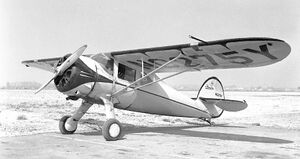Engineering:Luscombe Phantom
| Phantom | |
|---|---|

| |
| Role | Two-seat cabin monoplane |
| National origin | United States |
| Manufacturer | Luscombe Aircraft Engineering Company |
| First flight | 1934 |
| Number built | 25 |
The Luscombe Phantom was a 1930s American two-seat cabin monoplane and the first product of the Luscombe Aircraft Engineering Company.
Design and development
Donald A. Luscombe formed the Luscombe Aircraft Engineering Company in 1933 at Kansas City, Missouri. The Phantom or Model 1 was the first aircraft built by the company, and first flew in 1934. It was a high-wing braced monoplane with conventional fixed tail-wheel landing gear, and was powered by a nose-mounted 145 hp (108 kW) Warner Super Scarab radial engine. The fully enclosed engine cowling, with individual air vents for each cylinder, was unusual for a US radial engine light aircraft. Apart from the fabric wing surfaces, the aircraft was all-metal, and had a luxury interior with two side-by-side seats in an enclosed cabin. All compound curves were formed by one employee, Nick Nordyke.[1] As a luxury aircraft, it failed to sell in the economical climate of 1930s America, and the company went on to develop cheaper and simpler aircraft.
Variants
- D1L
- Brazilian Navy designation for the Luscombe Phantom.[2]
Specifications
Data from Air Progress
General characteristics
- Crew: 1
- Capacity: 1 passenger
- Length: 21 ft 6 in (6.6 m)
- Wingspan: 31 ft 0 in (9.4 m)
- Height: 6 ft 9 in (2.1 m)
- Wing area: 143.25 sq ft (13.308 m2)
- Empty weight: 1,320 lb (599 kg)
- Gross weight: 1,950 lb (885 kg)
- Powerplant: 1 × Warner Super Scarab radial engine , 145 hp (108 kW)
Performance
- Maximum speed: 168 mph (270 km/h, 146 kn)
- Cruise speed: 130 mph (209 km/h, 110 kn)
- Range: 560 mi (901 km, 490 nmi)
- Rate of climb: 700 ft/min (3.6 m/s)
See also
Related development
Aircraft of comparable role, configuration and era
- Monocoupe D-145
References
Notes
- ↑ Gene Smith. "Phantom!". Air Progress: 45.
- ↑ "Brazilian Military Aircraft Designations". https://designation-systems.net/non-us/brazil.html.
Bibliography
- Taylor, Michael J. H. (1989). Jane's Encyclopedia of Aviation. London: Studio Editions.
- The Illustrated Encyclopedia of Aircraft (Part Work 1982-1985). Orbis Publishing.
- Johnson, Caroline. "Pat the Pilot: American Aviatrix, WAFS Member and Allied Liaison". Air & Space Smithsonian. https://airandspace.si.edu/stories/editorial/pat-pilot-american-aviatrix-wafs-member-and-allied-liaison?fbclid=IwAR1DnXzYGCZ_DIn5H7RKIoWrLjTqoc3VwgklfgBEhy-0JCztjh0ldNHnqgE. (World War II story of female US aviator, with pictures of Luscombe Phantom)
Template:Luscombe aircraft Template:AvN aircraft designations
 |
